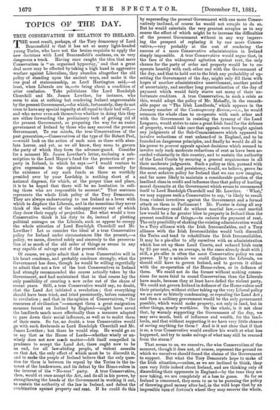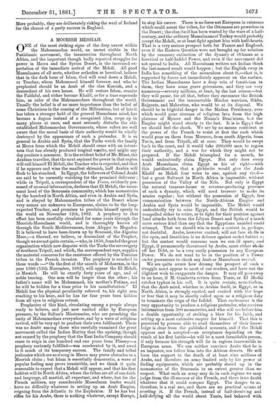TOPICS OF THE DAY.
TRITE CONSERVATISM IN RELATION TO IRELAND.
THE worst result, perhaps, of the Tory democracy of Lord Beaconsfield is that it has set so many light-headed young Tories, who have not the brains requisite to apply the new doctrines with Lord Beaconsfield's coolness, on so very dangerous a track. Having once caught the idea that mere Conservatism is " an organised hypocrisy," and that a great deal more may be effected by taking a high hand in aggressive warfare against Liberalism, they abandon altogether the old policy of standing upon the ancient ways, and make it the one goal of statesmanship, as Lord Hartington said,—at least, when Liberals are in,—to bring about a condition of utter confusion. Take politicians like Lord Randolph Churchill and Mr. James Lowther, for instance, who seem to aim at nothing but rendering Ireland ungovernable by the present Government,—for which, fortunately, they do not seem to have any special capacity at all equal to their bad will,— and who never even ask themselves whether in doing this they are either forwarding the preliminary task of getting rid of the present Government, or preparing the way for an easier government of Ireland by those who may succeed the present Government. To our minds, the true Conservatives of the past generation,—Conservatives of the type of Sir Robert Peel, —would look on the action of such men as these with abso- lute horror, and yet, as we all know, they seem to govern the party of which they form the advance-guard. Consider for a moment Mr. James Lowther's letter, enclosing a sub- scription to the Lord Mayor's fund for the protection of pro- perty in Ireland, in which he says :—" I would venture to give expression to the opinion that the necessity for the existence of any such funds as those so worthily presided over by your Lordship is nothing short of a national disgrace, for which, at the proper time and place, it is to be hoped that there will be no hesitation in call- ing those who are responsible to account." That sentence represents the whole Irish policy of the Tory Democrats. They are always endeavouring to use Ireland as a lever with which to displace the Liberals, and in the meantime they never think of the welfare of the unhappy country out of which they draw their supply of projectiles. But what would a true Conservative think it his duty to do, instead of plotting political outrages on the Liberals, such as appear to occupy the whole attention of Lord Randolph Churchill and Mr. Lowther ? Let us consider the ideal of a true Conservative policy for Ireland under circumstances like the present,—a policy, we mean, directed solely and sincerely to the preserva- tion of as much of the old order of things as seems in any way capable of salvage out of the present crisis.
Of course, we quite admit that a true Conservative will in his heart condemn, and probably condemn strongly, what the Government has done, though he would be willing regretfully to admit that not a few of the best Conservatives in Ireland had strongly recommended the course actually taken by the Government, and had maintained that in that course lay the only possibility of creating a new order out of the chaos of recent years. Still, a true Conservative would say, no doubt, that the Land Act initiated a revolution ; that everything should have been tried, and tried persistently, before resorting to revolution ; and that in the opinion of Conservatives, " the resources of civilisation "—amongst them a great emigration measure forced on Ireland by England—might have saved the landlords much more effectually than a measure adapted to pare down their social influence, as well as to mulct them of their rents. So far, no doubt, a true Conservative would go with such firebrands as Lord Randolph Churchill and Mr. James Lowther ; but there he would stop. He would go on to say that as the House of Lords—whether wisely or un- wisely does not now mach matter—felt itself compelled in prudence to accept the Land Act, there ought now to be an end, for all law-abiding people, of violent assaults on that Act, the only effect of which must be to discredit it, and to )sake the people of Ireland believe that the only ques- tion for them is between its repeal by the Tories in the in- terest of the landowners, and its defeat by the Home-rulers in the interest of the " No-rent " party. A true Conservative, then, would at once accept the Act, and do all in his power, by strengthening the hands of the Government in working it out, to sustain the authority of the law in Ireland, and defeat the combination spied property and rent, If he could do this
by superseding the present Government with one more Conser- vatively inclined, of course he would not scruple to do so. But he would entertain the very greatest scruples as to any course the effect of which might be to increase the difficulties of the present Government without in any way improv- ing the prospect of replacing it by one more Conser- vative,—very probably at the cost of rendering the success of a more Conservative administration in Ireland simply impossible. A true Conservative would argue that, in the face of the widespread agitation against rent, the only chance for the party of order and property would be to co- operate heartily with each other and with the Government of the day, and that to hold out to the Irish any probability of up- setting the Government of the day, might only fill them with hopes of another administrative unsettlement, another period of uncertainty, and another long procrastination of the day of payment which would fairly starve out many of their un- fortunate creditors. A true Conservative, in such a crisis as this, would adopt the policy of Mr. Mahaffy, in the remark- able paper on " The Irish Landlords," which appears in the January number of the Contemporary Review,—i.e., he would summon the whole class to co-operate with each other and with the Government in resisting the tyranny of the Land Leaguers, would strive to raise a great Irish fund for the defence of property, would take care that appeals were brought against any judgments of the Sub-Commissioners which appeared to involve reductions of rent unheard-of in England, and to be founded on dangerous principles, and finally he would do all in his power to prevent appeals against decisions which seemed to involve only such moderate reductions of rent as have been ac- corded voluntarily in this country, and to sustain the authority of the Land Courts by securing a general acquiescence in all their moderate judgments. Such a policy as this, pursued with firmness, courage, and persistency, would, we believe, prove far the most sedative policy for Ireland that we can now imagine, and far more likely to maintain a considerable portion of the landlord class in credit and influence than that policy of hurling- moral dynamite at the Government which seems to recommend itself to Lord Randolph Churchill and Mr. Lowther. What,' we may suppose such a Conservative to say, is likely to result from violent invectives against the Government and a formal attack on them in Parliament ? Mr. Forster is doing all any Irish Secretary could do without martial law,—and martial law would be a far greater blow to property in Ireland than the. present condition of things,—to enforce the payment of rent.. The only possibility of shaking the existing administration would be a Tory alliance with the Irish Irreconcilables, and a Tory alliance with the Irish Irreconcilables would both discredit the Tories and tend to rehabilitate the Irish Irreconcilables. It may be a pis-aller to ally ourselves with an administration which has set up these Land Courts, and reduced Irish rents by 25 per cent., on an average, in the cases already dealt with still, a pis-aller is often the most Conservative policy we can pursue. If by a miracle we could displace the Liberals, we should still have to govern Ireland, and to govern it either with the co-operation of the Home-rulers, or in defiance of them. We could not do the former without making conces- sions far more fatal to sound Conservatism than the Liberals have made, because they at least have defied the violent party. We could not govern Ireland in defiance of the Home-rulers-and their principles, without either taking up the very Liberal policy we are now so bitterly condemning, or repealing the Land Act ; and then a military government would be the only government, possible, which would make property, not only in land, but in other things, nearly worthless. On the whole, is it not clear that, by warmly supporting the Government of the day, we- ._ may save much, both of influence and wealth, for the land- lords, and that without supporting it we have very little chance of saving anything for them ? And is it not clear that if that is so, a true Conservative would swallow his wrath at what has happened, and try to make salvage of what may still be rescued from the storm ?'
That seems to us, we conceive, the wise Conservatism of the moment, though it does not, of course, represent the ground on which we ourselves should found the claims of the Government to support. Bat what the Tory Democrats hope to make of the Irish situation,—unless, as we are inclined to think, they care very little indeed about Ireland, and are thinking only of discrediting their opponents in England—by the tone they are now taking, we are completely at a loss to guess. So far as Ireland is concerned, they seem to us to be pursuing the policy of throwing good money after bad, in the wild hope that by an impossible tam a fortune's wheel they may recover the whole.
More probably, they are deliberately risking the weal of Ireland for the chance of a party success in England.







































 Previous page
Previous page